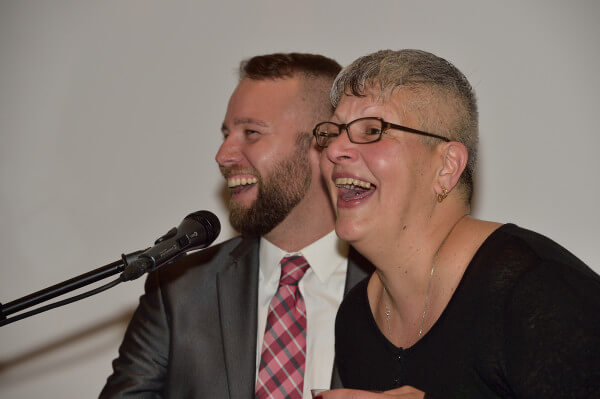When the Supreme Court accepted the petition by the US solicitor general that it take up Edie Windsor’s lawsuit against the federal Defense of Marriage Act (DOMA), it posed two questions that could derail any quick resolution about the 1996 law’s constitutionality.
First, the solicitor general must address whether the federal government’s “agreement” with the Second Circuit ruling that DOMA is unconstitutional deprives the Supreme Court of “jurisdiction to decide this case.” The high court also asked whether the Bipartisan Legal Advisory Group of the US House of Representatives (BLAG) — which includes the three most senior Republicans and the top two Democrats, split along party lines in their view of the case, and intervened at the trial court to defend DOMA when the Obama administration declined to do so — has legal standing to participate in the case.
Since the court assumed neither Windsor, the government, nor BLAG would argue to the high court that it lacks jurisdiction, the justices appointed Harvard Law School Professor Vicki Jackson as a “friend of the Court” to make that argument. Her brief, written with attorneys from Akin Gump Strauss Hauer & Feld LLP, was filed on January 24.
At justices’ invitation, Harvard Law Professor Vicki Jackson raises strong doubts
Though complex, the jurisdictional questions raise a serious possibility the court will not actually decide whether DOMA is unconstitutional in the Windsor case.
The Supreme Court has interpreted the Constitution’s provision that “judicial power” extends to “cases” and “controversies” as a limitation on the jurisdiction of federal courts — they are barred from issuing “advisory opinions,” but instead can only rule on issues disputed between parties who have something personally at stake.
Windsor, a widow who lives in New York, had to pay $363,053 in federal estate taxes that would not have been owed had the government recognized her Canadian same-sex marriage to Thea Spyer, who died in 2009. She clearly has a stake in this lawsuit, so it presented a real “controversy” to the US District Court for the Southern District of New York in Manhattan.
BLAG argues that since New York State did not adopt a marriage equality law until 2011, Windsor’s marriage would not have been recognized by the state had a case gone to its highest bench. Without state recognition, BLAG asserts, Windsor cannot argue the federal government must recognize her marriage. Lower courts, however, concluded otherwise, pointing to intermediate appellate courts in New York and state officials who agreed such a marriage would be recognized even absent a gay marriage law.
BLAG continues to hold to its argument that Windsor has no valid claim, though the assertion is made only in a footnote in its January 22 brief to the Supreme Court.
The real jurisdictional issue facing the high court relates to the roles the government and BLAG have played in the case. Prior to Windsor’s lawsuit going to court, President Barack Obama and Attorney General Eric Holder reconsidered their position on whether the ban on federal recognition of same-sex marriages in DOMA’s Section 3 was constitutional. When they concluded it was not, Holder informed Republican House Speaker John Boehner the administration would not defend DOMA in court, at which time BLAG intervened, while the Senate, under Democratic control, expressed no interest in doing so.
Paul Clement, solicitor general under President George W. Bush who represents BLAG as outside counsel, opposed Windsor’s motion for summary judgment, the Justice Department argued in favor of it, and the district court granted it.
Despite the administration’s support for Windsor’s suit, the Justice Department, having doubts about BLAG’s standing to appeal, filed an appeal of its own to the Second Circuit Court of Appeals to ensure the issue would continue making its way through the courts. Though the Justice Department argued before the Second Circuit that it should affirm Windsor’s district court victory, even before the appeals court ruled, both the solicitor general and Windsor filed petitions asking the Supreme Court to review the case. Even though the district court had ruled in their favor, they argued the DOMA question needed a definitive answer from the highest court.
After the Second Circuit affirmed the district court, the solicitor general filed an additional statement with the Supreme Court, arguing that this case, rather a ruling from the First Circuit that had earlier struck down DOMA’s Section 3, would make the best vehicle for ruling on its constitutionality. On December 7, the high court granted the solicitor general’s petition — but not Windsor’s — adding the questions about jurisdiction.
Professor Jackson’s brief argues the solicitor general’s petition does not present the court with a real “controversy” because the government does not disagree with the rulings from the Second Circuit and the district court. In effect, the government is simply asking the Supreme Court to affirm the lower court rulings.
If there is an adversary party, there is a real controversy to decide, and that’s where BLAG comes in. But does it have standing to argue for reversal of the Second Circuit decision?
A party has standing if they have a personal stake in the outcome of the matter that is distinct from the general interest any citizen has in the correct interpretation of the law. Windsor has a $363,053 stake in the matter, since she had to fork over the money. The government always has a stake in the question of whether a statute is constitutional, so nobody is questioning the solicitor general’s standing. But BLAG does not represent the government. Jackson points out that when it sought to intervene in the case, BLAG did not even officially represent the House of Representatives, much less Congress as a whole, as there was no resolution authorizing its action.
BLAG’s interest in the case is not particularized in the way Windsor’s interest is. None of the five members of BLAG has any individual stake in the outcome. Members of Congress may have a generalized interest in whether a statute they passed is constitutional, but not an individual, particularized interest. After distinguishing, in detail, the DOMA case from one in which the high court concluded Congress did have standing to intervene, Jackson concludes that the institutional prerogatives of Congress are not directly at stake in the question whether Section 3 of DOMA violates the Fifth Amendment’s equal protection requirements. Members of Congress might make their views known to the court through an amicus brief, but neither Congress as a whole, a single house of Congress, nor a small committee of members such as BLAG would have “standing” under the court’s precedents, she writes.
If BLAG does not have standing as a party, then there is no one properly before the high court seeking to reverse the Second Circuit’s decision, so there is no true “case” or “controversy,” which means “the judicial power” of the United States no longer extends to this case, Jackson strongly argues in her brief.
What if the court agrees with her? At the very least, the solicitor general’s petition for review would be dismissed. What would that mean for the Second Circuit’s ruling? Jackson suggests the Second Circuit might still have had jurisdiction to hear the appeal, based on various grounds, but it’s also possible that its jurisdiction would be found lacking as well. In that case, its ruling would be vacated, meaning that only the district court decision, rendered in response to Windsor’s valid claim challenging DOMA, would stand.
If Jackson’s analysis is embraced by the court, the practical result would be that for the remainder of the Obama administration, the only way a constitutional challenge to DOMA could get to the Supreme Court would be for a federal court of appeals to rule that it is constitutional, meaning the plaintiff would have standing to petition for a reversal. Meanwhile, litigation could continue in lower courts and, Jackson suggests, if all the circuit courts of appeal come to agree that it is unconstitutional, a consensus could be reached without the Supreme Court’s participation and the Executive Branch could stop enforcing the statute. But that might take many years.
The parties in the case will file briefs responding to Jackson’s arguments late in February, and the high court hears arguments during the last week of March, with a decision expected by the end of June.

































